Feature: Passion and Drive for Their Craft: An Interview with Studio Theatre's Production Apprentices
These young theatrical artisans are the next generation.
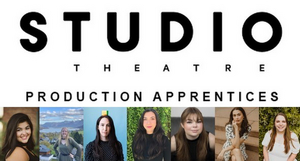
Something I have said many times is that I wish audience members would fully realize the amount of work and the amount of people it takes to put on a production. The things I have heard in theatre lobbies are both scary and laughable at the same time. Things like "Oh, I want a chance to crash that chandelier. It's just one button!" or "Wow, that didn't look hard at all. I could do that easily". Well folks, working in theatre is not an easy profession. It comes with lots of stress and long days but if you have the drive and passion, it can be very fulfilling.
Today I want to introduce you to seven young professionals who possess that drive and passion and are willing to put up with everything else for their craft. They are the Production Apprentices of Studio Theatre. Each of these artisans help bring together the many productions that Studio Theatre produces during a given season. They work alongside top directors and stage managers while also assisting on building the sets, hanging speakers, making sure the video elements are all ready to go, help in hanging, focusing, and programming lights and much more.
Studio Theatre's Apprentice Program officially started in 2006 after piloting an Apprentice program for early-career artists and administrators in 2005. The first class only had six in it. Today the program has anywhere between eleven and thirteen apprentices each season. It's not just on the production side either. Apprentices are also used on the administration and donor relations side of things too. To date, it is estimated Studio Theatre's Apprentice Program has seen 150 people take part.
Ok, it's time for me to get out of your way for a bit and let these talented individuals introduce themselves to you. You'll read about what their positions are at Studio Theatre first. From there you'll learn about their backgrounds and much more. I'll see you at the end of the article for some final thoughts.
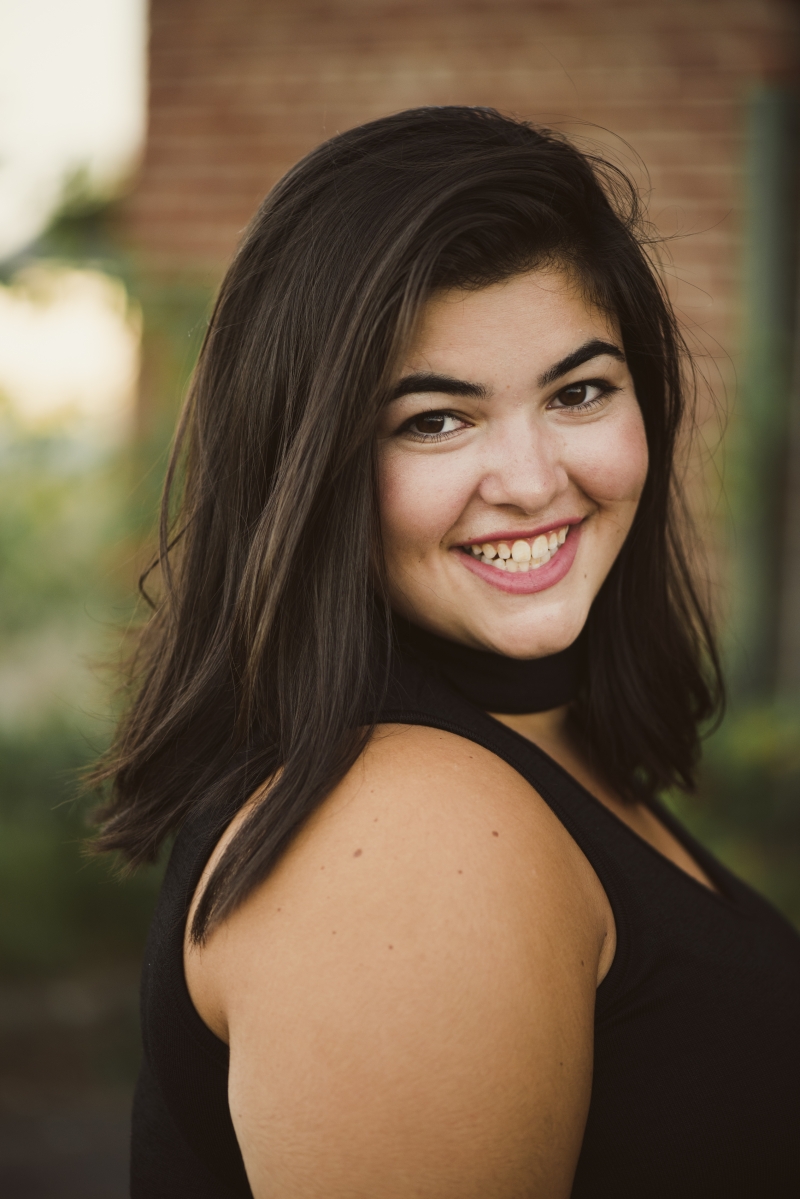
Clarice Berardinelli
Hometown: Braintree Massachusettes
Position: Production and Events Management Apprentice
"I work mainly in the administrative side of the Production Department but will be hands on in the Production realm surrounding the tech process and getting the show on its feet. The biggest piece of my job is maintaining the calendar for each production running and what is going on throughout all of the spaces within the building. I support the rest of my team in working with designers and making sure all departments have what they need to do their job effectively. The other big piece of my job is facilitating the external rentals for Studio, so I follow rentals from their initial inquiry to execution of the actual event. Most of this aspect of my job is made easier with already having knowledge of what space is available when, so it's easy to know when an external event can be plugged in."
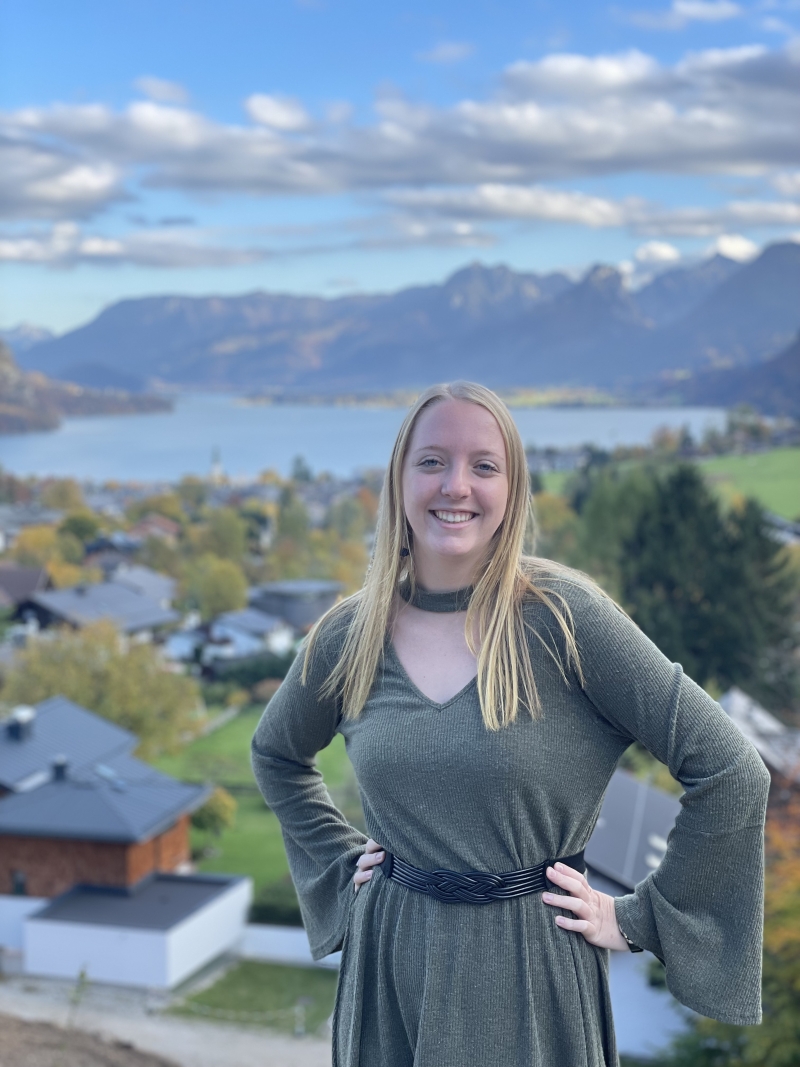
Delaney Dunster
Hometown: Loveland, Ohio
Position: Stage Management Apprentice/Assistant Stage Manager
"I work on three shows during Studio's season as an assistant stage manager. This season I have worked on People, Places and Things, currently working on English, and will work on Good Bones. Outside of these shows I might be asked to help out while another show is in tech, do some archiving and administrative tasks around the office, but most of my work is centered around the production I am on."
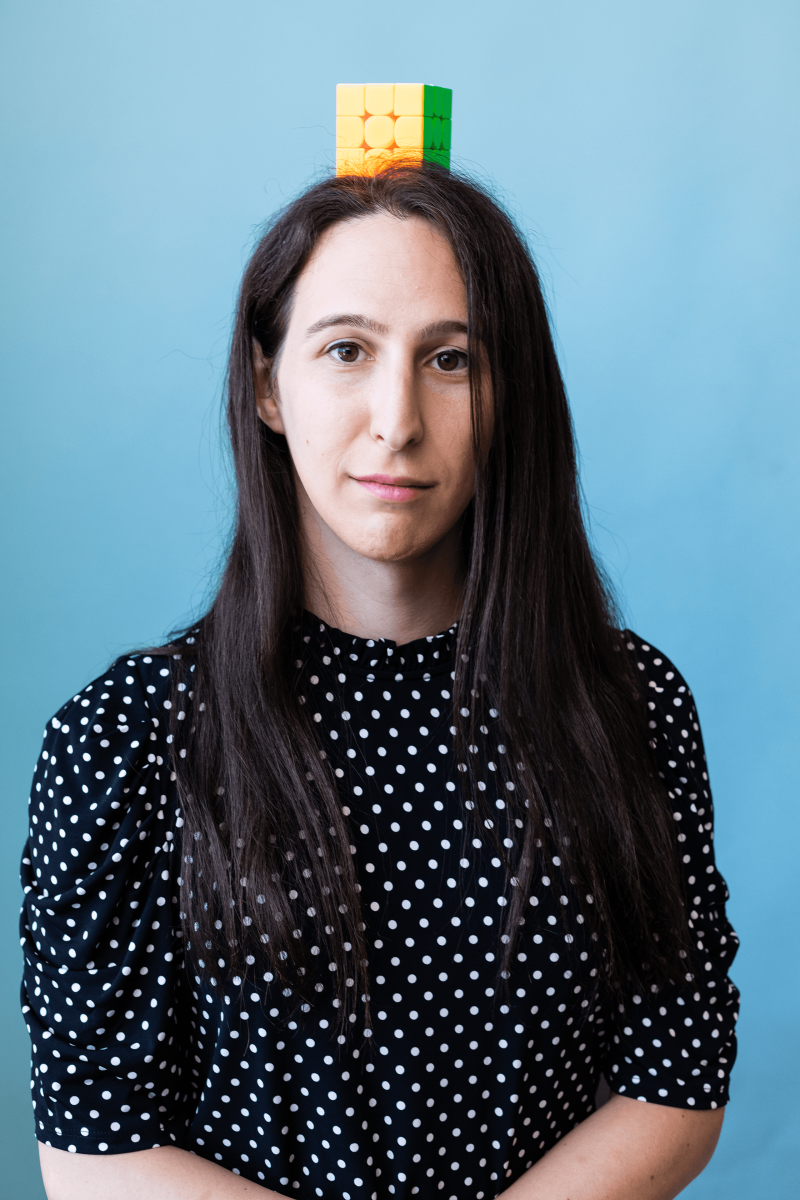
Emily Abrams
Hometown: Cherry Hill, NJ
Position: Directing Apprentice
"My primary responsibility is to assist the directors on each show. After the show opens, I am responsible for directing the understudy company, and working with the stage manager to ensure that all of the understudies are prepared in case they need to go on. Outside of the rehearsal room, I am also assisting with reading plays for the literary committee, as well as scouting for the artistic team, by going to see local shows. I also assist with casting, sending out tape requests to actors, updating files, and organizing the casting database. Depending on the time of year, I may be helping out with the gala, or writing articles to accompany the show and offer the audience a fuller understanding of the play they are coming to see."
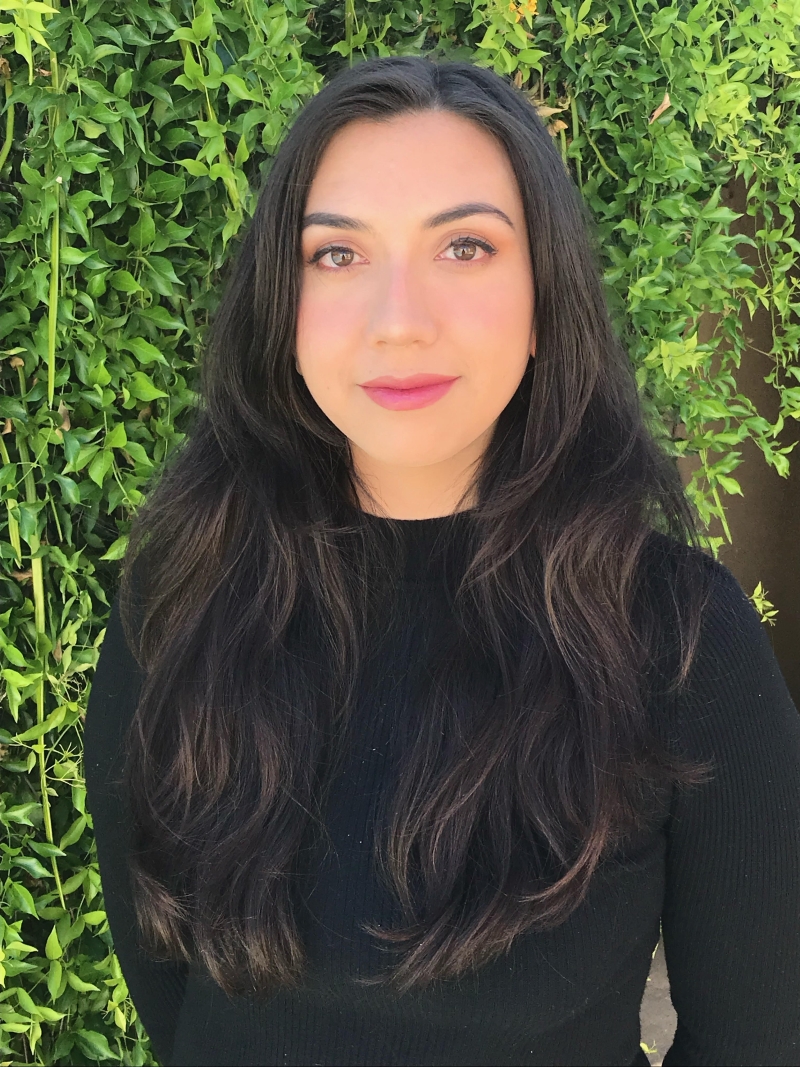
Indigo Garcia
Hometown: Phoenix, Arizona
Position: Electrics Apprentice
"I get to work closely with my supervisor to communicate with designers to make sure we get all their specifications for their designs in order. Before tech I am working with my supervisor to create a plan for and execute lighting hang and focus. I occasionally will call in orders for gel or other accessories that we need. During tech, I will work with the lighting designer as their programmer and will work as lighting board op through the first couple of previews. I also am involved in production meetings to take notes and stay up to date with the needs of the production. Day to day, we work on maintenance of the plot on shows that are running, strike and organize equipment from other shows, we help to set up rental contracts as needed and I will occasionally help with the Sound Department for what they need."
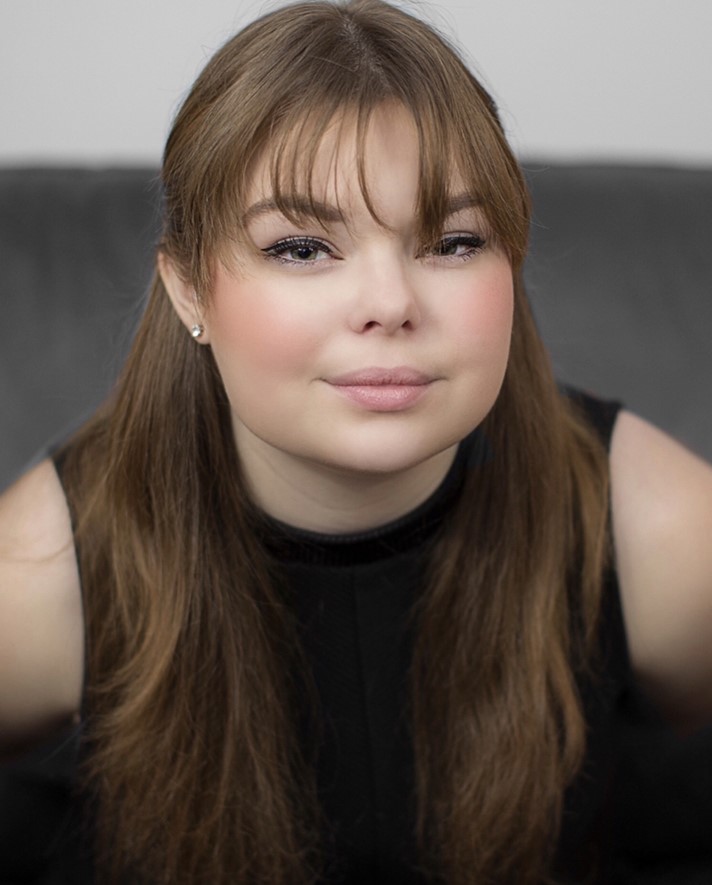
Miranda "MT" Taylor
Hometown: Long Island, NY
Position: Technical Director Apprentice
"I am in charge of assisting in build of each set, drafting, ordering materials, leading a team of over hire carpenters, ensuring there is clear and consistent communion with designers and honestly making sure the set goes up in time."
.
.
.
.png) Phoebe Sweatman
Phoebe Sweatman
Hometown: Cumming, GA
Position: Stage Management Apprentice/Assistant Stage Manager
"My specific responsibilities are dependent upon the show and the show's needs. For example, for Heroes of the Fourth Turning a lot of my responsibilities were focused on maintaining safety since there were elements of firearms, smoking onstage. For Clyde's my responsibilities are focusing on tracking all of the food elements and what that means in terms of food prep (where things go, what's fake, what's eaten, etc).
Of course, there are your usual stage management responsibilities of maintaining the paperwork and communicating scheduling needs and the maintaining of the show, etc. but it's been fun to see how those responsibilities ebb and flow from show to show and how different stage managers approach those responsibilities."
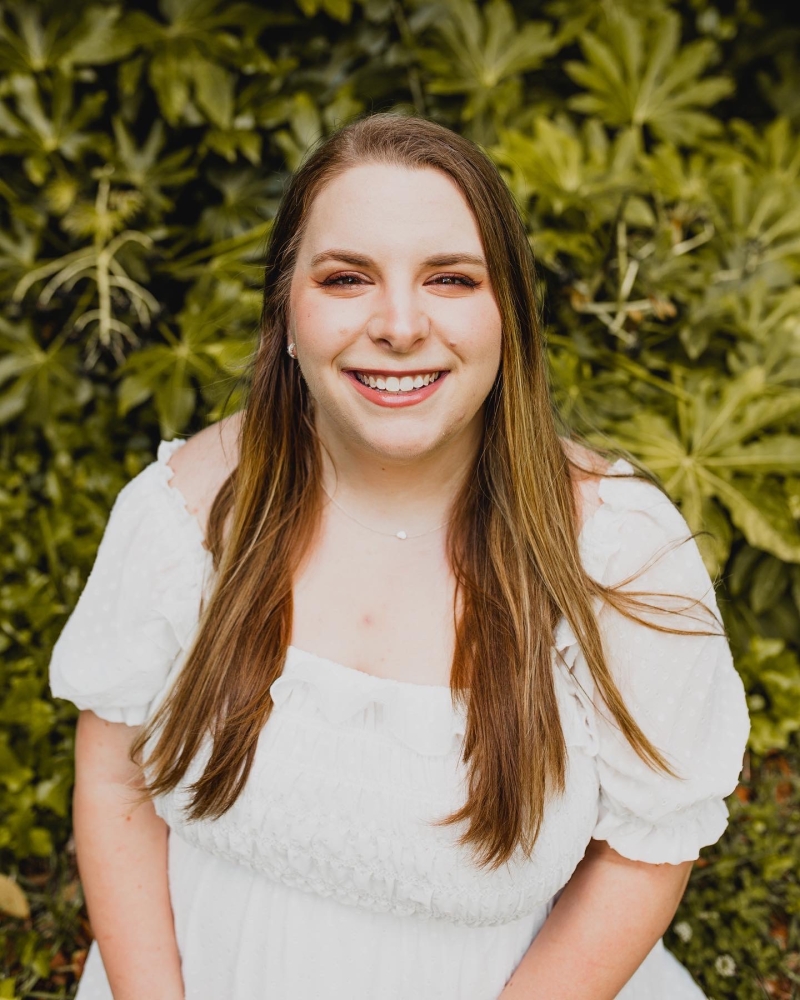
Sarah Velkovich
Hometown: Rock Hill, SC
Position: Sound and Projections Apprentice
"I work in the lighting and Sound Department. This department is responsible for getting all the lights, speakers, projectors, and TVs up and running for productions and events at Studio. Some of my more specific sound and projection responsibilities include working with visiting sound/projection designers, working as the sound board op during the tech process and previews, setting up audio and video monitors for the backstage & dressing room areas and executing designers' sound and/or projection plots. Often, I do have the pleasure of working in the lighting department to assist with hanging, focusing, and striking lights."
Growing up were you a theatre kid?
Clarice- Growing up, I wouldn't say I was a full-blown theatre kid, but theatre was definitely a piece of my identity. Music and theatre were not foreign in my household. I grew up very exposed to musicals and my parents definitely encouraged me to enjoy theatre and love it, I was not forced into the arts, but I was encouraged to try. I was the type of theatre kid who would play in my softball game in the morning before a Saturday matinee. As I grew into more into a high school age, I began to take theatre a bit more seriously, and would find myself listening to more cast albums, reading more plays, and just exposing myself to theatre in new ways.
Delaney- I was (weren't we all?). I participated in the little Christmas plays at church as a child which expanded to acting onstage in productions in middle school. My sophomore year of high school was when I transitioned to work backstage and, in the orchestra, (I play cello in my limited free time). My parents both were heavily involved in theatre as well, my dad mostly when he was young, and my mom directed shows at the high school where she taught, so they both encouraged my sister and I in our interest.
Emily- I was AWFUL as a kid! I never shut up. I would just yap-yap-yap-yap-yap. so my mom signed me up for a theatre class when I was 7, and I caught the bug HARD. I was the first actor to be off book, and I began learning all the other actors' lines, and I would get SO ANGRY when the other kids (who were just there to have a good time) would make mistakes. I was a perfectionist even back then. I would go up to the other actors and say "You're saying the line wrong. It should be said like this." And then when I found out there was a job for that, I was like "sign me up" and I have been completely insufferable ever since.
Indigo- I do remember going to shows when I was little but not often. It was always more of a special occasion or for a school field trip if I were to go. I didn't start working on shows until I was in high school, and I went immediately into lighting tech/design.
MT-I probably have been doing theatre since I left the womb. Some people grow up just knowing that they were born to be a doctor or be a parent or whatever, I have always had this feeling that I was born to be in theatre. I started acting at home-making my parents watch monologues I had written, then forcing my siblings and cousins to be in plays and homemade movies (that I wrote, directed, and stared in), and then once school theatre became an option-honestly it became my world. I was THAT theatre kid, but I didn't care, I knew that I was born to do it.
Phoebe- Yes! I got started with theatre in elementary school. I took dance when I was very little and was involved with the choir at my elementary school so when they announced there would be a school play it was a no brainer! My parents also took me and my brother to see shows growing up, which I'm very grateful for that exposure at such a young age.
I continued on with choir and theatre throughout middle and high school but it wasn't until my freshman year of high school that I discovered my love for technical theatre, specifically stage management.
Sarah- Growing up, I would say I was a theatre kid before I knew what being a theatre kid was. Until I started doing theatre regularly starting in the 11th grade, I had only been in one musical. I attended the occasional musical here and there but nothing on a regular basis. However, I had such an affinity for all things entertainment. I joined choir in the 7th grade and continued doing choir all throughout high school and college. This was the catalyst that propelled me into doing theatre in high school. I was fortunate to receive opportunities in several areas of theatre in high school including acting, dramaturgy, run crew, and scenic construction. During the last few years of my time in high school, I began to heavily get involved with a community theatre some of my friends introduced me to it. While I began performing on stage with this company, I transitioned over the years to becoming sound designer and A1 (mixer) for their mainstage summer shows while on summer vacation from school.
Did you go to school for theatre?
Clarice- In college I studied Arts and Entertainment Management. This program focused more on the administrative side of working in any form of entertainment (theme parks, sports facilities, museums, and theatres), so learning directly about theatre was only a piece of my education. I learned a lot more about how to maintain budgets, how the world is impacted by Arts and Entertainment, and all types of legalities surrounding the fields.
Delaney- I went to Webster University in St. Louis and got my BFA in Stage Management.
Emily_ I did! I went to the University of the Arts, where I got a BFA in directing, and then did a semester at The National Theatre Institute, where I was in the Advanced Directing Program.
Indigo- Yes, I went to school at Ithaca College and got my B.F.A in Theatre Production Arts with a concentration in Lighting Design.
MT- I started out as a BFA Musical Theatre major and eventually transferred during COVID to a small school in Boston and studied Theatre, Psychology (with a concentration in trauma) and English. I experimented in all different fields: therapy, education, directing, acting, set design and construction, production management. You name it- I probably did it.
Phoebe- I got my B.F.A. in Theatre Design & Technology (with a concentration in Stage Management) from the University of North Georgia. The theatre program, The Gainesville Theatre Alliance, through which I received my training is a collaboration between the University of North Georgia and Brenau University.
Sarah- I did not go to school for theatre. However, I did go to school for a major in the arts. I went to a small university called Anderson University for music and additionally completed a minor in psychology during my time there.

Theatres all over the country offer apprenticeship programs. What was it about Studio Theatre's program that drove your decision to choose it for your apprenticeship opportunity?
Clarice-My path to Studio was a bit different than the majority of the other apprentices in this track. Coming out of college in May, I had a full-time job and felt I was pretty set. Once I started that job, I quickly learned after a month or so, that I hated it, and quit by the first week of July. Both of my sisters live in Washington, DC and encouraged me to just come and visit for a couple weeks. Since I was going to be coming down anyway, I decided to start and look for some jobs down here to see if I could possible setup an interview while I was visiting. In these searches, I stumbled upon Studio's apprenticeship program, and it sounded like a really cool opportunity/ I was FAR past the application date, but I ended up emailing Studio very simply being like "Hi, I want to work here, what apprenticeships are open?" In a much more professional way of course, but I wanted to be able to move out of my hometown, I knew DC was a city I had interest in moving to, and I really didn't have a lot to lose by asking the question of what was available. I had an interview that week, and Studio was looking to make an additional apprentice track in the Production Management team and accepted the position by the end of the week. I remember texting one of my sisters "I'm not going to come visit anymore, I'm actually just going to be moving there in a week". This program has so much to offer, and I think on paper the program matches what happens in actuality.
Delaney-I applied to a handful of different apprentice programs and luckily got to pick which program was right for me at this time. I was excited about the opportunity to live and work in DC. I like that Studio does a lot of new works. But I of course was also thinking about cost of living so the stipend and company-provided housing were very important to me.
Emily- My directing mentor-who taught me everything I know-had done this program 10 years prior and had talked about how much he had learned from it. Also, there are plenty of artistic / directing apprenticeships, but this is one of the only ones that really keeps their directing apprentice in the rehearsal room the entire time.
In- I had been living in DC for a year prior to the apprenticeship and wanted to stay here, that was my main motivation. In doing my own research, Studio Theatre looked like a great theatre that produces new plays and would give me a lot of hands-on experience and other opportunities. I also saw it as a great place to begin to explore the theatre scene and meet new people in DC.
MT- Very early on in college I started studying the psychology of empathy and how theatre manifested an empathetic experience and how we as humans could develop our empathy skills through theatre (probably every essay I ever wrote in college mentioned it and I eventually went on to do a college TED talk about the subject). I eventually developed my artistic mission statement that said: As an artist I strive to bring about empathy, open-mindedness and as a result community to a growing apathetic and dividing society through redemptive storytelling. In other words, I wanted to create empathetic and intimate theatre- and Studio Theatre's mission is to do exactly that. Not to mention I really wanted to get a hands-on learning experience (and the free housing in the nation's capital is also a huge plus). I honesty had no idea before coming here that DC was such a huge theatre town and now, I never want to leave.
Phoebe- I was really intrigued by the style of theatre in which Studio produces and their focus on New Works. I had the opportunity in college to learn about new works through a new play festival and wanted to explore that side of theatre a bit more.
The location also played a large part in the decision, because as many people know, DC is full of different theatre companies of all shapes, sizes, and styles. To me this was such an incredible place to get started in laying the groundwork for my career. I also had a professor from college who had previously worked in theatre in DC and her insight about the area, Studio, and all the connections I was bound to make helped a lot in my consideration of the program as well. Her insight really helped to put things into perspective of just the amount of opportunities and promise that DC held for me.
Sarah- A few months before graduation, I began looking for prospective job opportunities that I would like to be a part of. In all honesty, I had no clear idea what I wanted to do or where I wanted to go. I entertained the possibility of becoming a music therapist, a music director, or even a music teacher. However, none of those completely satisfied the creative spirit I wanted so desperately to develop professionally. I decided to apply for a wide variety of creative opportunities to see what was out there and where I felt I could achieve this goal of mine. When I came across Studio's page about their apprenticeship, I thought the program overall sounded like a good opportunity for early theatre professionals to get a head start on their career. One of the biggest things that drew me to Studio Theatre was their artistic vision. Most of my experience in theatre up to this point has included working on large-scale musicals. I was fond of Studio's commitment in producing theatre that was contemporary in nature and thus spoke to the conversations and events happening in society today. I also strongly desired to work on new works and that is an integral part of producing theatre at Studio. This is accomplished here through world premieres, regional premieres, and workshops/readings.
Clarice- Unlike some theatre companies, Studio Theatre sometimes will have more than one production up ad running at the same time. Working on just one show at a time presents a lot of stress so can you please tell us how you keep from getting overstressed when working on multiple shows at once?
Putting on multiple shows at once can definitely be stressful, but I definitely take strides to minimize how high that stress level gets to me. When working through a tech process, everyone in that space is anticipating higher stress levels, so it makes things feel a little less tense, because you know everyone is feeling that way. In those days too, telling yourself a stressful couple of days is worth it to make a beautiful piece of art, helps a lot. I keep myself very organized both on paper and virtually, to allow myself to have knowledge of what's going on for each production in multiple areas. Having pieces moving on up to three shows at a time is crazy, but the chaos helps me stay even more up to date. I work a lot to maintain a pretty healthy balance between the work I'm doing here and my life outside of Studio. Having time outside of a theatre allows me to maintain a love for the work I'm doing.
Delaney- What would you say has been your most stressful SM experience so far either at Studio Theatre or elsewhere?
I don't know if stressful is the right word, but my first year of undergrad, a number of students in my program took the opportunity to try for the world record of putting together a musical in a day. This means: opening the box to find out the show in the morning, auditioning, casting, blocking, music rehearsals, set design, sound design, lighting design, teching the show, and then performing the show before an audience that evening, off book. At the time, the group that held the record did Annie, and I can't remember exactly how many hours they had done it in (I think maybe 16 hours?) so we aimed to do ours in a couple hours fewer than that. I was one of the assistant stage managers on the production. We opened the box at 6am on a day in April of 2019 and found out that we were given A New Brain. We were honestly surprised that that was the production we received when the other group had gotten Annie. Most of the group was not familiar with the show, but we immediately jumped into action to get the show together. The day was so fast paced. While the director got auditions underway, the other ASM and I started printing scripts, and doing a quick setup of the rehearsal space once our set designer had decided what he wanted for our look. We ran rehearsals all morning and afternoon, throwing together paperwork, with cameras recording our whole process. While we were in rehearsals, our designers were in the theatre space getting all of the tech elements ready to go. At the end of the day, we did have a performance. We did not beat the record because our cast was not completely off book (I mean I can't blame them, if it had been Annie, I absolutely believe they would have been. This show was just not at all what we had expected). Before going into the performance, we all knew that we weren't going to get it this time around, but I think we all had a blast putting up the show anyway. It was an absolutely amazing experience and there was such an incredible level of teamwork that day. I am proud to have been part of that group and would definitely say yes if the opportunity came to try it again.
Emily- Why did you think directing was right for you over another facet of working in theatre?
When I was working as a performer I was never in the moment because I spent all of my time on stage being concerned about choices that other actors were making. It's what made me a terrible actor, but a great director. I knew that I wanted to be the person to bring everyone onto the same page and curate all the ideas that are generated when bringing a play to life.
Indigo- What was it about working in lighting that appealed to you over costumes, scenic or any of the other concentrations in theatre?
As a designer, lighting is where and how storytelling made sense to me. I grew up in a very artistic family. All my siblings in some form are musicians and one of my brothers along with being a musician is also a painter and they always influenced me. Light is how we can paint and carve atmosphere, and composing a scene in light feels a lot like composing any other artwork or piece of music. I can just clearly see the character of light and the journey I want it to go on with the script and the characters when I design. And I can envision it in a way that I couldn't with costumes and scenery, even though those are both very tactile disciplines which is funny to me. I just found lighting and the magic in what it reveals and keeps hidden, exciting and fun to explore.
MT- What would you say has been the most challenging set you have had to build during your apprenticeship thus far?
I think the better question would be what set hasn't been challenging. Every set comes with its own unique challenges and quirks. However, I think thus far, the most challenging set was People, Places and Things. Studio Theatre recently opened a newly renovated space that is a black box theatre-this show was chosen and designed to show that "flex" space off. It was my first show that I had been a present apprentice for the full process-unfortunately at that time we did not have a technical director. Therefore, not only were we learning about how to use and communicate about this new space, we were trying to build a set that had a levitating ceiling, lights, knife tracks and all the bells and whistles, and I was learning my way around Studio, AND I was trying to figure out how to lead a team of overhire crew. It was by far one of the most difficult 8 weeks I have ever had in theatre.
I learned a lot about how to problem solve and be creative-because at the end of the day no one actually knows how to build a floating ceiling that moves up and down, that holds an entire set, in a gigantic theatre space, that is actor and audience safe, and is pleasing to the eye, and has lights attached to it-- I could keep going. I learned a lot about knowing that it's okay to not have all the answers right off the bat and to take time to research and explore. I learned a lot about delegation (aka I cannot build an entire set by myself), and scheduling. Most importantly, I learned a lot about work, life balance, which is a very valuable lesson this early on in my career. I was living at the theatre all day, every day. It was the only thing I thought about for weeks. I've now learned how to use my time effectively when I am in the space and leave work at work and find thing I enjoy outside of the theatre.
Phoebe- If you were not working as a stage manager in the theatre, what other department would you most like to be a part of?
If I were not working as a stage manager I'd likely be working as a scenic artist. I've always enjoyed painting and drawing but only recently discovered in college my natural inclination toward the craft. I still get to do some work here and there but not as much as I'd like to if I'm honest.
Sarah- What do you think are some key things in creating good sound design for the theatre?
I think that the main thing in creating good sound design for theatre lies in not being noticed. I know this may sound contradictory but hear me out. If one were to go to a show and not notice any issues with the sound, then I've done my job. I want every piece of my design to be intentional and non-intrusive to what is happening on stage so that it accentuates it and does not distract from it. Another thing that I believe is important for a good and effective sound design is understanding the world a show takes place in. Creating ambience with the background noise of a radio playing, horns honking down the street, crickets chirping, or birds chirping adds just the right amount of authenticity and realism to the story (no matter where or when it takes place). Doing this not only makes the story on stage feel more authentic but subconsciously allows the audience to be more comfortable and relate to the story more.
Delaney- Can you please pick a musical and a play that you have seen that you would most like to work on a production of?
Hmm a musical and a play... for the play, I think I would pick Peter and the Starcatcher. I love that play so so much, and just the magic involved in any kind of Peter Pan story. I fell in love with the book first and got to see the play for the first time while I was in high school at Cincinnati Playhouse in the Park. It's just such a lovely, overall light-hearted story that I think encourages everyone to let go and remember the imagination of being a child and what we all believed to be possible. For the musical, I would absolutely love to work on Hadestown at some point. I was very interested in Greek mythology as a child (and of course loved the Percy Jackson series) and was just swept up by this telling and the beautiful music. I first fell in love with it in the summer of 2019 and have loved seeing how the production has grown. I got to see it last year and was just so blown away by the energy in that room. I also just love the number of people who gasp at the end when Orpheus turns around. This story is centuries old but people are still surprised and heartbroken by how it ends. And just as the show ends, Hermes says: "To know how it ends, and still begin to sing it again, as if it might turn out this time." How this show that ends so sadly, still can be wrapped up with a sense of hope to it at the end is just so beautiful to me. I would be so honored to have the opportunity to work on that production.
Indigo- As an audience member, what would you say has been a true WOW moment in terms of the lighting?
I really don't have a specific show moment that I can recall as a "WOW" moment for lighting. I'm lucky to have seen a lot of shows with wonderful designers that left me in awe. And I've seen shows that were just feats of technology and meant to be showstopping spectacles and other shows that were very powerful in emotion that were smaller in production. What all those moments have in common is the understanding of balance; when to build and when to release. Being able to see those pivotal moments done on stage with perfect timing will always get me.
MT- You have a phycology background and as we all know, theatre types can be sometimes challenging to work with. Do you think your phycology background has helped you in dealing with scenic designers who sometimes want the impossible?
We get ALL sorts of people in theatre and my psychology background has been beyond helpful, especially during tech week when everyone is exhausted, and we all think we have the perfect answer for every problem. I spent some time interning with a trauma therapist in college, I learned alot about how to converse with people and allow them to discover the solutions. Nothing is impossible in theatre. Because it is theatre! A suspension of disbelief. If you want to make elephants fly in a space they can fly, but the way that elephants fly is the problem we have to solve-maybe its projection, lights, puppets. Will we make actual elephants fly? No way, but there is always a creative solution. Sometimes designers have a hard time seeing and rethinking the creative solution because they imagine and visualize their set a certain way. It is my job as a TD to help them to navigate these things. Communication is also key, which my psychology background has helped immensely with. People want to be in the loop and for you to be up front about it. If we know at the beginning that something is not going to work in our space or we need to rethink our creative route, it's essential to communicate that. This also helps with burnout (which Technical Directors are extremely prone to). The short answer is yes, everyday I am more thankful for my psychology degree as I navigate the vast number of people I work with everyday.
Sarah- Here is a scenario. Your boss at Studio Theatre comes to you and says "We have an opening for a sound designer on one of the shows this season". Which production do you choose to design and why?
When I came to Studio in August just as the theatre was beginning to prep for the 2022-2023 season, I was already interested by several of the productions in Studio's season. I would say I would be most interested in sound designing a production of People, Places, and Things by Duncan MacMillan. I really love the script and I love the idea of several technical elements coming together to communicate the reality of addiction through a distorted lens of view. One of the main intents of this show is to communicate to the audience the experience of addiction both mentally and physically. There are so many small things that can be done in the sound design to distort the reality of the story in a way that forces the audience to experience how intoxication, withdrawal, and recovery from addiction can feel.
Emily- Every director strives for perfection. When it doesn't happen, I imagine it becomes maddening. How do you as a director get past watching a performance that might not be as perfect as you would have liked?
Every director strives for perfection, but it can never be achieved. There is always something else to tweak, and some other adjustments to be made. And! Theatre is a live-in the moment-art form, where one night you might get closer to perfection than any other. So, I get as close to I can, and I am always trying to focus on celebrating all of the achievements in a production, rather than focus on the places I would like to improve.
Clarice- What do think is the most gratifying thing about working on the production side of things at Studio Theatre?
I love having a hand in creating this type of art. At the end of the day, I could do this type of job at any company, but the best part of it, is being able to come into a theatre every day. If the show I'm working on helps just one person find their love for theatre, or discover something about themselves, I consider that a success.
Phoebe- If someone were to come to you and say " I have the chance to be a part of the Studio Theatre apprenticeship program and I'm not sure if it's for me." What would you say to convince them?
This program is a really great opportunity to meet a lot of wonderful people in the DC area and really dive in and learn about the path you are planning to pursue. If you're coming here right out of college this is a great starting off point for your career. If you're coming back after taking time away from theatre this is a great way to relearn and familiarize yourself with the craft. There are so many opportunities here, if you have the chance to be a part of it, why not take that next step?
After your apprenticeship ends, are you hoping to continue to work in DC theatre?
Clarice-I'm definitely hoping to continue working in DC theatre post apprenticeship. I have loved immersing myself in the DC theatre scene for the last 6 months, and I definitely feel like I haven't been able to take in all that DC can give me. I would love to be able to stay in a production management area but would definitely be open to exploring other areas within theatre to stay in the area.
Delaney- I would love to keep working in DC, it's been a really great place to live and work but am open to see what other opportunities may come my way. Things always work out how they're supposed to, so I'll end up where I'm meant to be.
Emily- My hope and goal is to return to NYC, but I would love the opportunity to return to DC if the right gig came along!
Indigo- I really enjoy the DC theatre scene, there is so much excitement and growth every year and I would love to continue to work in it. Having just started out in my career, I am looking forward to every opportunity that I get to do. I would love to explore outside of DC, but I am happy to have found this community.
MT- After my apprenticeship I am hoping to pursue a path towards either production management or theatre education. I love helping set other people up for success (and I need a break from all the saw dust getting into my lungs haha). I would absolutely love to stay in DC-the theatre scene here is so alive, intimate and seeking for more. I am not looking to work on Broadway where theatre is commercialized or being put on for money, I want to work in an area where people are looking for their voices and other people's voices to be heard and DC is the place to be for that.
Phoebe- Yes! I am hoping to continue working in DC. It's weird thinking about things down the line when we only just started rehearsals for Clyde's but I have plans to start submitting my resume and letting people outside of Studio know that I exist. I have enjoyed my time here and the people so far and haven't found a reason to leave yet, so I hope to stick around a little bit longer.
Sarah- After my apprenticeship, part of me does hope to stay in DC to continue growing in my career as a sound engineer and designer in theatre. I really admire and like exploring the DC theatre scene as it is quite different from anything I grew up with. There is a good mix of musicals and plays (both old and new) here in DC which allows for a diverse and vibrant mix of productions to work on.
As you have just read, the Production Apprentices of Studio Theatre have that drive and passion I talked about at the top of this piece. Every one of them is immensely talented in each of their apprenticeship disciplines. I hope this interview has given you a glimpse into what it akes to put up a production and that you now realize that while there is plenty of theatre magic, nothing in theatre happens by it. Behind every helicopter or chandelier, there is a person or persons pulling the ropes or driving that vehicle.
For anyone wanting to pursue theatre as a career, I highly urge you to consider joining Studio Theatre's Apprentice Program. Clarice, Delaney. Emily, Indigo, MT, Phoebe, and Sarah are just a few of the talented and driven people to take part in the program and I can honestly say that you will be seeing thier names in playbills all over the country,and dare I say, the world. They are and the program is the real deal!!
Phoebe Sweatman's headshot by Armina Dizdarevic.
Studio Theatre Production Apprentices logo artwork designed by JJ Kaczynski.
Comments
Videos

